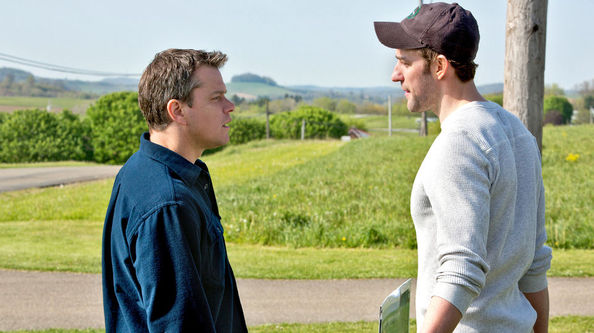On the surface, the movie Promised Land (Van Sant, 2012) might seem like an anti-fracking film as it clearly portrays natural gas companies as manipulative and irresponsible. But the real message of the film is not “fracking is bad;” rather that, as a society, we’ve lost the concept of how to “take care of something.” This could mean the earth, but it also could mean a family, a town, friends, or even oneself.
The protagonist, Steve Butler (Matt Damon), is a representative for Global Crosspower Solutions, a leading natural gas company. He is effective at convincing people to sell their property so that his company can erect gas drilling equipment on their family homesteads and farms. He is good at doing what he does, he says, because he comes from a small “farming” town (Eldridge, Iowa) similar to each one that he “closes”—one in which the economy collapsed due to the flight of industrial employers to foreign shores. Now, Steve tells the people, the only thing saving them from bankruptcy and poverty (in other words, going the route of his hometown) is the natural gas sitting beneath their diminishing fields. And he seems to believe it, because he works tirelessly and sometimes desperately to get the people to sell their land. When questions begin to come in as to the dangers of fracking, and the town supervisor decides to hold a vote, Steve’s mission becomes more urgent, and he faces the additional challenge of an environmentalist who seems equally determined to thwart Steve’s plans.
Over the course of the movie, Steve gets to know several of the townsfolk, including a school teacher named Alice (Rosemarie DeWitt). As she is showing him the land she owns from her back porch (and as he is explaining how his company would use it), he notices the garden on her patio. She tells him that sometimes she brings her class to come and help her tend it. He asks her why she is teaching farm kids how to farm, and she replies that that’s not what she’s doing—she’s teaching them how to take care of something.
This becomes a theme. Another character, Jeff (Scoot McNairy), asks Steve what kind of message it would send to his nephew, whom he takes care of, if he sold the family farm on which he has tirelessly worked, which was handed down from his grandfather, to his father and now to him. Clearly, it would be a quick fix at a huge cost. Adding further to the theme, the town vote itself is not as much a statement against fracking as much as it is about giving the people a choice—not just treating them like a cash cow. It gave the townsfolk the power to decide how to take care of their land and community.
The removal of the community’s voice, particularly in the decisions about fracking, is the main concern of this movie. The destruction of the environment by pollution is one thing; the destruction of towns, families and lives by greed and irresponsibility is another. The latter is the deeper theme of Promised Land, and it is one that transcends the fracking issue, highlighting the tragic cultural trend towards seeking instant gratification over the long-lasting fruits of hard-work and patient endurance.


 RSS Feed
RSS Feed
